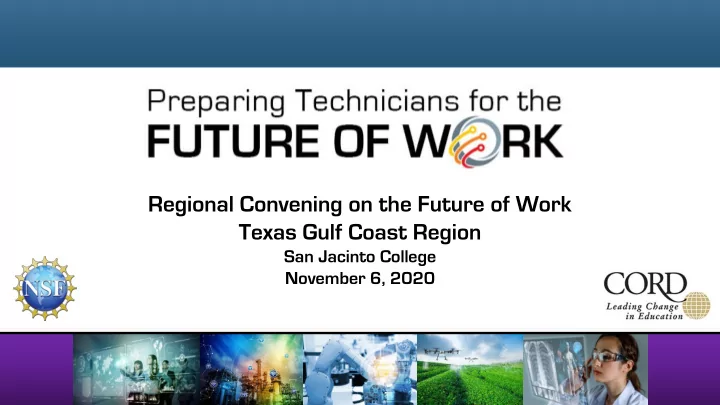

Regional Convening on the Future of Work Texas Gulf Coast Region San Jacinto College November 6, 2020
Introduce Yourself… ➢ AECOM ➢ Collin College ➢ Greater Houston ➢ Jetco Delivery Partnership ➢ Aggreko ➢ COM/Gulf Coast ➢ Hire-Pathways ➢ Lone Star College Safety Institute ➢ BASF ➢ CSSIA ➢ Houston Community ➢ Northwest Louisiana College Technical Community College ➢ Brazosport College ➢ Dallas College ➢ Houston Pilots ➢ Port of Houston Authority ➢ CBT ➢ Donald McCoy & ➢ INEOS O&P USA ➢ Wharton County Junior Associates College
Our thanks to…
Welcome Hope Cotner President, Center for Occupational Research and Development (CORD) Co-PI, Preparing Technicians for the Future of Work
Preparing Technicians for the FUTURE of WORK Welcome to San Jacinto College
A National Science Foundation Advanced Technological Education (NSF ATE) Project Ann-Claire Anderson, Principal Investigator
Project Mission Enable the NSF-ATE community (2-year colleges) to collaborate regionally with industry partners, within and across disciplines, on the transformation of associate degree programs to prepare US technicians for the work of the future.
Project Leadership Team • Ann-Claire Anderson , PI • Dr. Richard Gilbert , Co-PI Vice President, Special Projects Professor, Chemical and Biomedical CORD Engineering, University of South Florida College of Engineering Research • Hope Cotner , Co-PI • Dr. Marilyn Barger , Special Advisor President, CORD Director, Florida Advanced • Dr. Mike Lesiecki , Co-PI Technological Education (FLATE) Senior Consultant, CORD; Retired Center of Excellence Director, MATEC Networks • Liz Myrick , Project Manager
Texas Gulf Coast Regional Convening Purpose ▪ Share our findings on the cross-cutting, interdisciplinary skills and knowledge needed by technicians ▪ Discuss new technologies and their impact on future technician education ▪ Identify ways in which the project can collaborate with regional colleges and workforce entities on issues related to preparing the skilled technical workforce for the future
Community Colleges: Powering the Future Through Collaboration Chancellor Brenda Hellyer
New Foundational, Cross-cutting Knowledge and Skills that should be taught in all STEM technical programs
Knowledge & Skill Areas to “Future Proof” STEM Technicians? ▪ Skill Area 1: Business Knowledge and Processes ▪ Skill Area 2: Advanced Digital Literacy ▪ Skill Area 3:Data Knowledge and Analysis
Foundational Skills for All STEM Technicians Business Advanced Data Knowledge Digital Knowledge and Processes Literacy and Analysis
Why are these skills critical? “A core benefit of foundational skills is the capacity to adapt: having a broader skill base isn’t simply about meeting the needs of today’s jobs. Rather, these skills equip jobseekers and incumbent employees for the future, enabling them to navigate a dynamic landscape of accelerating change: job losses, job changes, and job creation.” “Jobs Lost, Jobs Gained: Workforce Transitions in a Time of Automation” (New York: McKinsey Global Institute, 2017)
Skill Area 2: Advanced Digital Literacy Understand digital communications and networking; cloud interface; cybersecurity; machine learning, sensors, programming and human-machine interfaces at a higher than introductory level
Essential Cross-Cutting Skills in Advanced Digital Literacy 1. Artificial Intelligence 6. Digital twins ▪ Machine learning 7. Edge computing 2. Automation/robots * 8. Network architecture ▪ Human-Machine Interface * 9. Network/device communication * ▪ Internet of Things (IoT) 3. Basic programming ▪ Security controls * 4. Function block diagram programming 5. Digital literacy/fluency * ▪ Cloud literacy
WEF, Future of Jobs 2020
Technology Adoption Rate by Industry Cloud financial services, government, education, digital information and communication, transportation IoT/connected devices : healthcare, engineering, construction, oil & gas, digital Encryption & cybersecurity digital information and communication, financial services, government Artificial Intelligence & Machine Learning digital info and communication, financial services, healthcare, transportation WEF, Future of Jobs 2020
Tomorrow’s Workforce: Leading Through Disruption John Sands Principal Investigator, NSF ATE Center for Systems Security and Information Assurance, Moraine Valley Community College
Preview of Next Week’s Topic – Skill Area 3: Data Knowledge and Analysis Manipulate, interpret, compare, contrast, merge, and “operate” on data to resolve issues/problems and use Excel and other common software proficiently to accomplish tasks
Essential Cross-Cutting Skills in Data Knowledge and Analysis 1. Computational thinking * 5. Data management ▪ 2. Data analysis * Data storage ▪ ▪ Statistics Spreadsheets * ▪ ▪ Analytics tools * Data modeling ▪ ▪ Data visualization * Databases ▪ 3. The data management life cycle Query languages ▪ 4. Data literacy/fluency * Data backup and restoration
Number of These Job Roles Increasing 1. Data Analysts and Scientists 6. Business Development Professionals 2. AI and Machine Learning Specialists 7. Digital Transformation Specialists 3. Big Data Specialists 8. Information Security Analysts 4. Digital Marketing and Strategy Specialists 9. Software and Application Developers 5. Process Automation Specialists 10.Internet of Things Specialists
THANK YOU www.preparingtechnicians.org
Recommend
More recommend